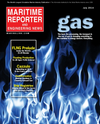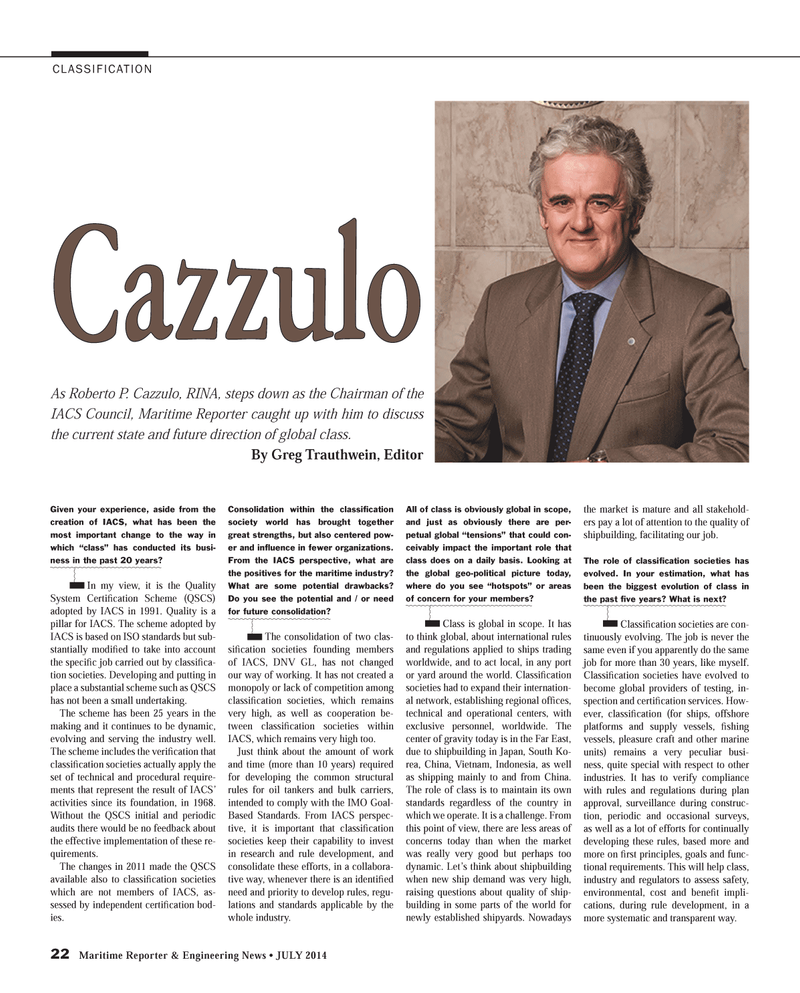
Page 22: of Maritime Reporter Magazine (July 2014)
Offshore Energy Structures & Systems
Read this page in Pdf, Flash or Html5 edition of July 2014 Maritime Reporter Magazine
22 Maritime Reporter & Engineering News • JULY 2014
CLASSIFICATION
Given your experience, aside from the creation of IACS, what has been the most important change to the way in which “class” has conducted its busi- ness in the past 20 years? In my view, it is the Quality
System Certifi cation Scheme (QSCS) adopted by IACS in 1991. Quality is a pillar for IACS. The scheme adopted by
IACS is based on ISO standards but sub- stantially modifi ed to take into account the specifi c job carried out by classifi ca- tion societies. Developing and putting in place a substantial scheme such as QSCS has not been a small undertaking.
The scheme has been 25 years in the making and it continues to be dynamic, evolving and serving the industry well.
The scheme includes the verifi cation that classifi cation societies actually apply the set of technical and procedural require- ments that represent the result of IACS’ activities since its foundation, in 1968.
Without the QSCS initial and periodic audits there would be no feedback about the effective implementation of these re- quirements.
The changes in 2011 made the QSCS available also to classifi cation societies which are not members of IACS, as- sessed by independent certifi cation bod- ies.
Consolidation within the classifi cation society world has brought together great strengths, but also centered pow- er and infl uence in fewer organizations.
From the IACS perspective, what are the positives for the maritime industry?
What are some potential drawbacks?
Do you see the potential and / or need for future consolidation? The consolidation of two clas- sifi cation societies founding members of IACS, DNV GL, has not changed our way of working. It has not created a monopoly or lack of competition among classifi cation societies, which remains very high, as well as cooperation be- tween classifi cation societies within
IACS, which remains very high too.
Just think about the amount of work and time (more than 10 years) required for developing the common structural rules for oil tankers and bulk carriers, intended to comply with the IMO Goal-
Based Standards. From IACS perspec- tive, it is important that classifi cation societies keep their capability to invest in research and rule development, and consolidate these efforts, in a collabora- tive way, whenever there is an identifi ed need and priority to develop rules, regu- lations and standards applicable by the whole industry.
All of class is obviously global in scope, and just as obviously there are per- petual global “tensions” that could con- ceivably impact the important role that class does on a daily basis. Looking at the global geo-political picture today, where do you see “hotspots” or areas of concern for your members? Class is global in scope. It has to think global, about international rules and regulations applied to ships trading worldwide, and to act local, in any port or yard around the world. Classifi cation societies had to expand their internation- al network, establishing regional offi ces, technical and operational centers, with exclusive personnel, worldwide. The center of gravity today is in the Far East, due to shipbuilding in Japan, South Ko- rea, China, Vietnam, Indonesia, as well as shipping mainly to and from China.
The role of class is to maintain its own standards regardless of the country in which we operate. It is a challenge. From this point of view, there are less areas of concerns today than when the market was really very good but perhaps too dynamic. Let’s think about shipbuilding when new ship demand was very high, raising questions about quality of ship- building in some parts of the world for newly established shipyards. Nowadays the market is mature and all stakehold- ers pay a lot of attention to the quality of shipbuilding, facilitating our job.
The role of classifi cation societies has evolved. In your estimation, what has been the biggest evolution of class in the past fi ve years? What is next? Classifi cation societies are con- tinuously evolving. The job is never the same even if you apparently do the same job for more than 30 years, like myself.
Classifi cation societies have evolved to become global providers of testing, in- spection and certifi cation services. How- ever, classifi cation (for ships, offshore platforms and supply vessels, fi shing vessels, pleasure craft and other marine units) remains a very peculiar busi- ness, quite special with respect to other industries. It has to verify compliance with rules and regulations during plan approval, surveillance during construc- tion, periodic and occasional surveys, as well as a lot of efforts for continually developing these rules, based more and more on fi rst principles, goals and func- tional requirements. This will help class, industry and regulators to assess safety, environmental, cost and benefi t impli- cations, during rule development, in a more systematic and transparent way.
Cazzulo
As Roberto P. Cazzulo, RINA, steps down as the Chairman of the
IACS Council, Maritime Reporter caught up with him to discuss the current state and future direction of global class.
By Greg Trauthwein, Editor
MR #7 (18-25).indd 22 6/30/2014 10:13:24 AM

 21
21

 23
23
